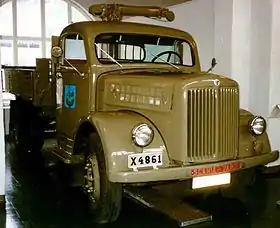| Scania-Vabis L10/L40/L51 Drabant | |
|---|---|
 | |
| Overview | |
| Manufacturer | Scania-Vabis |
| Production | 1944 - 1959, 14,090 produced[1] |
| Body and chassis | |
| Class | Medium/heavy duty truck |
| Powertrain | |
| Engine | Scania-Vabis ohv inline 4 |
| Transmission | 4/5 speed manual |
| Dimensions | |
| Wheelbase | 3.4 m (133.9 in) - 5.0 m (196.9 in)[1] |
| Curb weight | 8,500 kg (18,739.3 lb) - 11,500 kg (25,353.2 lb) (gross weight)[1] |
| Chronology | |
| Predecessor | Scania-Vabis 325 |
| Successor | Scania-Vabis L55 |
The Scania-Vabis L10/L40/L51 was a series of trucks produced by Swedish automaker Scania-Vabis between 1944 and 1959.
Scania-Vabis L10
During the Second World War Scania-Vabis’ entire production went to the Swedish Armed Forces and other public institutions. The company designed a new generation of trucks for post war times, when the pent-up demand for new trucks was expected to boom. The first post-war model, L10, was introduced in 1944.[2] It was the first Scania-Vabis truck with left hand drive. The L10 Series had a four-cylinder variant of the module engine Scania-Vabis had introduced in the late 1930s, which was also built in the six- and eight cylinder versions, as petrol or diesel engine. The diesel engine in the L10 series was a pre-chamber engine. The truck could also be delivered with four-wheel drive, a version known as the F10. It had a war time chassis and military trucks were also sold with petrol engine.
Before the war, Scania-Vabis purchased many components from Germany and Great Britain, but these were now largely replaced by Swedish-made components. Unfortunately, production was in several cases started without adequate testing and those first postwar trucks suffered quality problems that cost Scania-Vabis both money and reputation to repair.[3]
Scania-Vabis L40
At the end of 1949, Scania-Vabis introduced a direct injected diesel development of their module engine. It had been designed in collaboration with British truck manufacturer Leyland Motors.[3] With the new engine, the four-cylinder truck got its name changed to L40. Otherwise the truck was mostly unchanged. In early 1950 there were also a small number of the four-wheel drive F40 built, before that model disappeared because of low market demand. In 1951 the old fashioned non-synchro four-speed gear box was replaced by a synchronized five-speed transmission.
Scania-Vabis L51 Drabant
In the spring of 1953 the final development of Scania-Vabis’ module engines were introduced, with larger displacement. The four-cylinder truck was now called L51 Drabant, with a payload capacity of 5.5 to 6 tonnes. It was also the first Scania-Vabis truck with a proper name.
Engines
| Model | Year | Engine[1] | Displacement | Power | Type |
|---|---|---|---|---|---|
| F10 | 1944-49 | Scania-Vabis B402: I4 ohv | 5,650 cc (345 cu in) | 115 bhp (86 kW) | Petrol engine |
| L10,F10 | 1944-49 | Scania-Vabis D402: I4 ohv | 5,650 cc (345 cu in) | 90 bhp (67 kW) | Pre-chamber diesel |
| L40,F40 | 1949-53 | Scania-Vabis D422: I4 ohv | 5,650 cc (345 cu in) | 90 bhp (67 kW) | Direct injection diesel |
| L51 Drabant | 1953-59 | Scania-Vabis D442: I4 ohv | 6,232 cc (380.3 cu in) | 100 bhp (75 kW) | Direct injection diesel |
Gallery
 1946 Scania-Vabis L12
1946 Scania-Vabis L12 1949 Scania-Vabis L44
1949 Scania-Vabis L44 1954 Scania-Vabis L51
1954 Scania-Vabis L51
References
- 1 2 3 4 Lindh, Björn-Eric (1992). Scania: fordonshistoria 1891-1991. Stockholm, Sweden: Streiffert & Co. ISBN 91-7886-074-1.
- ↑ Scania Group - history Archived 2012-09-27 at the Wayback Machine
- 1 2 Scania trucks: A century on the road